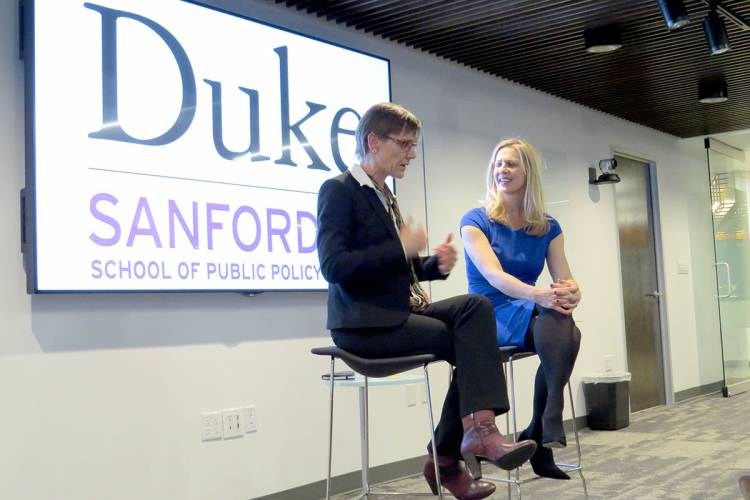On the Hill, Deans Promote Higher Education's Power to Transform Lives
Steelman, Kelley visit D.C. to share visions for the future of their schools
Now in their positions for several months, Deans Judith Kelley of the Sanford School of Public Policy and Toddi Steelman of the Nicholas School of the Environment visited Washington, D.C., Nov. 27 and 29 to share their visions for the future of environmental science and public policy with policymakers and members of the wider Duke community.
The deans each spent a day speaking with Members of Congress and their staff, journalists, and alumni in conversations meant to further one message: Duke advances society. As Duke looks forward to the next era of scholarship and service, Deans Steelman and Kelley urged the D.C. community to conceive of the modern university as a means of collective community improvement.
Kelley spoke at an evening alumni event Nov. 27 with Amy Hepburn, Felsman Fellowships Adjunct Faculty at the Sanford School, about Kelley’s personal story and her path to Duke. As an immigrant who received financial aid to attend a California community college, Kelley spoke to the ability of college and graduate education to be a transformative experience – both in one’s perspective on life and one’s professional opportunities.

Steelman spent much of her day Nov. 29 on Capitol Hill meeting congressional representatives and their staff to discuss the role of environmental science in policy-making. Steelman emphasized the importance of sustainable jobs and how she is more than “just an environmentalist.”
As a compliment to that idea, she shared how the Duke Marine Lab is now fully recovered from its Hurricane Florence damage.
“The value [of the Duke Marine Lab] is threefold” said Steelman in an end-of-day interview with Duke in DC staff. “We are good neighbors who volunteer in the community, as we have with our efforts with the Boys and Girls Clubs in the region; we demonstrate and practice resilient co-existence in how to live in this complex land and sea-scape; and we are doing cutting-edge research to learn about our changing biophysical and social environments during a time of changing climate.”
Steelman also shared that image of sustainable, environmentally responsible coexistence with a roomful of university alumni later that evening Nov. 29 when the Duke Alumni Association regional office hosted her for an event. The conversation focused on the importance of retaining environmental determinants in current policy-making.